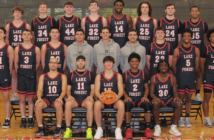Christian Hirschboeck ’25
Sports editor
hirschboeckcia@lakeforest.edu
In collegiate athletics, the difficulties endured to be a participant are rarely touched on, and something continually relevant for athletes in the modern day is the role of race. Because of the historical oppression of African Americans in the United States, the path to becoming a collegiate athlete is something that has largely gone unnoticed. In honor of black history month, I will be taking a step back from simple coverage of the College’s athletics, and instead focusing on what it means to be an African American athlete in the NCAA.
Pictured above is former Stentor reporter, Hilda L. Reedom, who graduated with the class of 1976. Outside of her connection to the newspaper, she was also a prominent figure in Lake Forest College’s athletic and academic communities during her time here. Reedom was a three-time winner of the Women’s Basketball program’s Most Valuable Player award, also ending her career as the team’s captain. Besides that, Reedom was a member of the Black Ensemble, African Students for African Liberation, and placed on the college’s Dean’s list.
Hilda is just one example of a successful African American athlete at the college, and despite how the times have changed since her time in Lake Forest, the path for young African American athletes looking to play the sports they love in the NCAA has not always been clear.
Participation of African Americans has varied on a school-to-school basis and while there are a few instances of black athletes being allowed to play before the civil rights movement, such as UCLA’s Jackie Robinson between 1939-1941, these opportunities more generally came following the 1960’s when segregation and discrimination were deemed illegal.
Despite the illegality of discrimination, it has not stopped this issue from persisting. While discrimination may have cooled from the programs themselves, it has not changed how it affects players from other sources. Noted in a 2020 study by RISE, racism has affected somewhere close to 65% of college athletes, with the statistic increasing to 77% for coaches and athletic staff. This can stem from fans, social media, and even other players.
Those numbers are alarming to say the least. All athletes are created equal, but again, the path to participation has not been shaped the same for everyone. With that in mind, I took the time to ask various African American athletes across campus about their personal experiences of being a collegiate athlete. Here are their responses:
Q: What does being an African American college athlete mean to you?
A: “ Being an African American student-athlete is a big part of my identity. Without volleyball, I would not be who I am today. Many athletes can relate to this. I always looked up to black female athletes as a child, and they gave me hope that I could succeed in my athletic endeavors. My goal is to encourage young African Americans who are athletes to pursue their athletic dreams,” (Lilli Evans, Volleyball).
Q: How, if at all, have the different aspects of your African American identity defined your experience as an athlete throughout your life?
A: “Being an African American student-athlete has had numerous challenges in terms of racial discrimination throughout my life. When I was younger, a lot of people believed I played basketball and said I would be amazing at it, even though they had never seen me play. This was my first encounter with stereotypes. Upon reflection, I can understand why I received this statement so frequently: basketball is mostly played by African Americans, and a lot of people believed that I did as well. As I grew older, I witnessed microaggressions, which are more overt incidents of racial prejudice. I was frequently questioned about how I styled or straightened my hair. Some coaches and teammates would also touch my hair, oblivious to how uncomfortable it made me feel. When I entered college, I understood that I had to defend my teammates and myself in these awkward circumstances. I eventually discovered my voice and now utilize it to educate others about microaggressions and the harm they cause to African Americans,” (Lilli Evans, Volleyball).
Q: Do you think the NCAA does a good job at supporting African American athletes during the entirety of the year, or is there a special emphasis given mostly during Black History Month?
“I think there’s a special emphasis given only during Black History Month. The NCAA does support African American athletes, but I feel that they can do more year-round. Our identity of being African American shouldn’t only be discussed and acknowledged for one month out of a 12-month calendar. Year-round support would ensure that we receive equal opportunities like our peers,” (Maurissa Edwards, Women’s Basketball).
Q: How important to you is Black representation at all levels of sports, from high school or college to professional, and in turn, the platform that sports can provide for African Americans?
“I believe Black representation is extremely important at all levels of sports from high school to professional sports leagues. One specific example of Black representation I’ve experienced is through the NBA, as they are doing an amazing job teaching the importance and significance of Black History. I hope the NCAA can take a similar approach not only during Black History Month, but throughout the year as well,” (Elijah Bull, Men’s Basketball).




